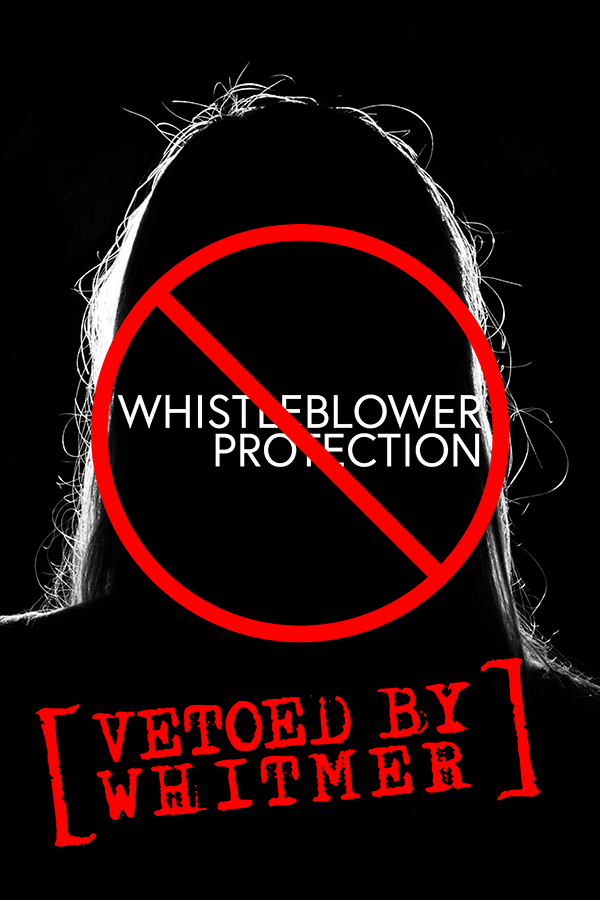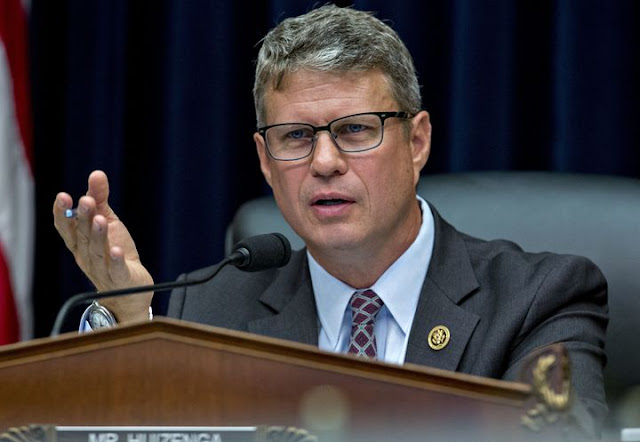By Brandon Hall
(Email Him At WestMIPolitics@Gmail.com)
Read more:
Breaking: Governor Whitmer Ends Whistleblower Protection For State Employees
Whitmer Begged Lansing Lobbyists: Get Republicans To Support My Gas Tax Hike! (Or Have Funding For Your Projects Vetoed)
_________________________________________________________________
From Friday's Gongwer:
Ms. Whitmer declared an identical section in 13 budget bills unenforceable, asserting it violates the separation of powers. The language has been placed in budget bills each year dating back to the early 2000s.
"A department or state agency shall not take disciplinary action against an employee for communicating with a member of the Legislature or his or her staff," the section removed in each of the 13 budget bills said.
In the past, governors will recommend the removal of this language in their budget proposals. Then the Legislature placed the boilerplate language back in when passing budget bills. Finally, the Legislature in conference committee keeps the language and the governor has let it remain once it arrives on his or her desk.
The boilerplate language is not the only line of defense for whistleblowers. There is also the Whistleblowers' Protection Act, passed in 1980.
"For her to take that out is just indefensible," said Sen. Tom Barrett (R-Charlotte), whose district includes a large number of state employees.
Mr. Barrett chaired the Senate Appropriations Justice and Public Safety Subcommittee and said the move could cause a chilling effect for those who may have information on state government problems within agencies or complaints about supervisors, for example.
Mr. Barrett said it appears to him that Ms. Whitmer resents the idea of equal branches of government. He also called it hypocrisy for Democrats to be praising the current whistleblower complaint against President Donald Trump that has led to an impeachment investigation while not calling out a reduction in whistleblower protections on the state level.
Mr. Barrett said he has had a few complaints brought to his attention from state employees in the past and his wife works for the Department of Health and Human Services. He questioned the impact striking the language could have on state workers in his district as a result of removing an additional layer of protection.
"To me, it's disappointing to see that struck out," House Appropriations Chair Rep. Shane Hernandez (R-Port Huron) said.
Mr. Hernandez said the move weakens good governance, adding private suggestions from state employees on how to improve government efficiency as well as in addressing shortcomings in operations or leadership can be less likely to come to light as a result.
Sen. Aric Nesbitt (R-Lawton) went a step further, noting among the issues Ms. Whitmer campaigned on was government transparency, which by stripping the whistleblower language is a move toward doing the opposite while in office.
"She doesn't have their backs," said Mr. Nesbitt, who chairs the Senate Appropriations Licensing and Regulatory Affairs Subcommittee, of state employees.
Tiffany Brown, spokesperson for Ms. Whitmer, in a statement called whistleblower protections important and said executive directives issued by the governor shortly after taking office on issues including government ethics show a proactive approach by the governor on the topic.
However, she said whistleblower protections must comply with the Constitution, saying the boilerplate language does not.
"As the attorney general concluded, these provisions regarding communications with the Legislature, included in many appropriations bills, violate the state Constitution's multiple provisions requiring a separation of powers because a department's disciplinary policy is a core executive function," Ms. Brown said. "As state courts have affirmed, one branch of government cannot provide oversight for another branch in personnel matters."
She also added that the attorney general has concluded the provisions "violate the Constitution's rule against a law carrying out a purpose not encompassed in the law's title."
"Most bills that included this provision had as their purposes to make appropriations," Ms. Brown said. "This provision, however, did not make an appropriation nor create conditions on the spending of appropriated funds, and therefore violated this constitutional requirement."
Rep. Aaron Miller (R-Sturgis) chairs the House Appropriations School Aid and Department of Education Subcommittee. The education funding budgets he oversaw in committee were among the ones that did not contain the boilerplate language.
Despite him personally not having a large volume of communications with state employees nor anything that would approach the level of whistleblower content, he said there is the optics of what Ms. Whitmer did to consider.
"The message it sets is what's more important," Mr. Miller said. "I don't think it's a good one."











